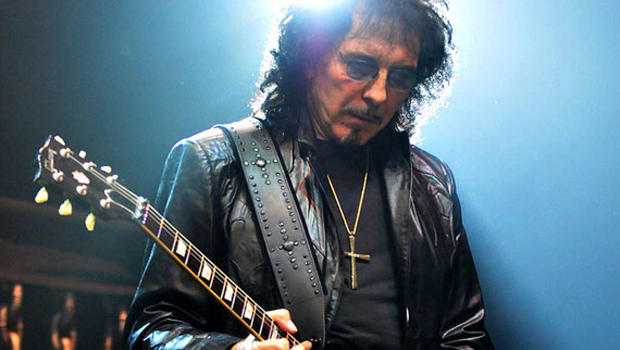Interview: Tony Iommi Discusses His New Book, 'Iron Man: My Journey Through Heaven and Hell with Black Sabbath'
All the latest guitar news, interviews, lessons, reviews, deals and more, direct to your inbox!
You are now subscribed
Your newsletter sign-up was successful

These days, the book store has just as many musical legends as the record store. There are dozens of great autobiographies out there from Ace Frehley, Sammy Hagar, Duff McKagen and many more.
One title that is sure to catch the attention of any metal fan is that of Black Sabbath guitarist Tony Iommi. His new book, Iron Man: My Journey Through Heaven and Hell with Black Sabbath, from De Capo Press is now available in hardcover and gives the reader a rare look into the life of one of metal’s most reserved and respected musicians.
We had a chance to talk to this living legend about his experience writing the book.
You’ve got a new book out, Iron Man: My Journey Through Heaven and Hell with Black Sabbath, and it’s been a great read so far. Can you describe the experience of sitting down and writing this book -- and what TJ’s (T.J. Lammers, co-author) role was in the process?
We started about two years ago and TJ would come to my house and stay over for three days. We usually did three days at a time and put up a couple tape machines and just talk. We’d come out about 10 hours later and we’d take a break and go back and write it all up. Then he’d come back another time and do three more days. We did that for a period of a couple years.
You’ve been a career musician. Is it surreal to look at yourself in 400-plus pages?
It’s very strange. For me, I’ve never talked about my private life. It’s always been about Black Sabbath. It’s strange to open up and talk about me as a young lad, my relationships, marriages and what not. I found that very hard.
All the latest guitar news, interviews, lessons, reviews, deals and more, direct to your inbox!
I know you’ve been surrounded throughout your career by front-men who typically do a lot of the talking. I found that as a fan of Black Sabbath and Heaven & Hell, it was very interesting to go back and learn more about you as a person. You mention in the book that you left school at age 15. In Birmingham, was 15 where school ended typically for kids?
It was if you were like I was: not very good at school. I hated school. After 15, you went off to college if you were good enough. It didn’t appeal to me so I left school. I did what everybody did, get a job.
One of the stories in the book, the industrial accident that took part of your fingers, is familiar to anyone who has followed your career. The thing that stood out to me is that, where you were with the Birds and the Bees -- getting ready to take that big jump -- and the heartbreak that that must have caused. What was it like to go through that?
Absolutely awful. Here I was ready to leave my job. I’d given my notice the week before and to have that accident on the day I was leaving was devastating. All my thoughts of being out on a plane and playing went straight down the tubes. It was very difficult to accept that. I was very depressed.
Your mother was the reason you went back to work that day. She was trying to instill a good work ethic in you. Did find yourself resenting your mother?
I was probably not very pleased with it, and she probably felt really bad as well for making me go back to work and finish the day. At the time I was so depressed and down. It was hard to accept life. Playing was all I wanted to do.
You alluded to this question in the book. Why didn’t you just flip the guitar over and play it right handed?
Thinking of it now and if I had known what I know now, I probably would have. It seemed like I’d already been playing three years and that I’d have to start again. It seemed like an eternity. It didn’t seem like an option.
You talk about fighting with the string manufacturers to go with a lighter gauge to help you with bending and also concerns people had with your tone. Is that what led you to make the switch from the Stratocaster to the SG?
No, I used to use the Strat and I loved the Strat I had. I’d done all the work on it myself. I took everything down and constantly had it in pieces to do some adjustments to it, to the pickups. I was fanatical about getting it to play better for me. The only reason I went to Gibson was, when we were in the studio recording the first album and I was recording “Wicked World” with the Strat, the pickup went. I had the SG there and I used that. I used that for the album. I thought since that was the sound on the album, that was it.
You talk very glowingly about a band called The Shadows and Cliff Richards and their melodies. How do you think that shaped the musician you became?
I think everyone starts out with somebody. At the time for me, because they were playing instrumentals, they were great. It was something you could actually learn. There were very few instrumental bands around. You had The Ventures in the States and we had The Shadows. They were tunes you could learn and play with a band. It sort of helped me. Of course, it had nothing to do with how I ended up sounding, but it started me off. It gave me something to learn.
In the book you said one of your supervisors at the factory where you had your accident brought you a Django Reinhardt record. You mentioned that it had a big impact. Can you talk about that?
Yes, I was very depressed at the time. The manager brought me an EP and told me to a listen, and I said, "No I don’t want to." But I did and I said, "Yeah, it’s great." Then he told me the story of Django Reinhardt and it really inspired me. I felt inspired to knuckle down and do something about it and solve my problem.
You mention how you used vibrato on the guitar as opposed to full chords because of the difficultly fretting full chords. How did you stumble onto that technique?
More I worked on it sounding full. There were only two guitars. From our day, there were always three guitars. You had a lead guitar, rhythm guitar and a bass player. We had bass player and a lead guitar player. I wanted to make it sound full so I started putting vibrato on the 5th.
You have had a lifelong relationship with Geezer Butler, specifically as a bassist. His style of playing is certainly more elaborate than most bass players. When you write, do you have to consciously work to keep your guitar lines out of the way of his bass lines?
No, absolutely not. We just play away and he just plays the right thing, really. It’s been good, especially the way he plays, he’s not a one-note bass player. He bends the strings and can follow me to a tee. Over the years of playing together, we developed that harmony and he knows what I’m going to play.
Iron Man: My Journey Through Heaven and Hell with Black Sabbath is available now.
